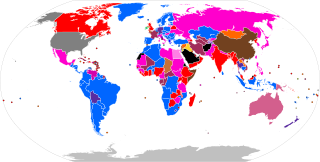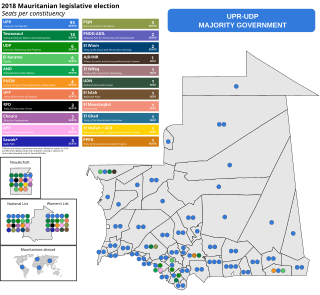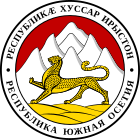
Proportional representation (PR) refers to any type of electoral system under which subgroups of an electorate are reflected proportionately in the elected body. The concept applies mainly to political divisions among voters. The essence of such systems is that all votes cast – or almost all votes cast – contribute to the result and are effectively used to help elect someone – not just a bare plurality or (exclusively) the majority – and that the system produces mixed, balanced representation reflecting how votes are cast.

The additional-member system (AMS) is a mixed electoral system under which most representatives are elected in single-member districts (SMDs), and the other "additional members" are elected to make the seat distribution in the chamber more proportional to the way votes are cast for party lists. It is distinct from parallel voting in that the "additional member" seats are awarded to parties taking into account seats won in SMDs, which is not done under parallel voting.
Mixed-member proportional representation is a mixed electoral system which combines local majoritarian elections with a compensatory tier of party list votes, which are used to allocate additional members in a way that aims to produce proportional representation overall. In most MMP systems, voters get two votes: one to decide the representative for their single-seat constituency, and one for a political party. Some countries use single vote variants of MMP, although this article focuses primarily on dual vote versions of MMP.
An electoral district, also known as an election district, legislative district, voting district, constituency, riding, ward, division, electorate, or (election) precinct, is a subdivision of a larger state created to provide its population with representation in the larger state's constituency. That body, or the state's constitution or a body established for that purpose, determines each district's boundaries and whether each will be represented by a single member or multiple members. Generally, only voters (constituents) who reside within the district are permitted to vote in an election held there. District representatives may be elected by a first-past-the-post system, a proportional representative system, or another voting method. They may be selected by a direct election under universal suffrage, an indirect election, or another form of suffrage.

The single-chamber Parliament of Georgia has 150 members, elected for a four-year term through elections. The last presidential elections were held in October 2018 due to constitutional changes taking effect in 2024, after which the president will be elected for a five-year term by a parliamentary college of electors. The series of constitutional changes, initiated in 2017, stipulated a one-time transitional presidential term of six years for 2018–2024. Other major systemic changes included a move to a fully proportional system by 2024 with a 5% threshold.
At a national level, Greece holds elections for its legislature, the Hellenic Parliament.

The Mäjilis of the Parliament of the Republic of Kazakhstan, commonly referred to as Mäjilis or Mazhilis is the lower house of the Parliament of Kazakhstan, alongside the upper house Senate. Together, they form the national bicameral legislature of Kazakhstan, responsible for enacting legislation. Established by the Constitution of Kazakhstan following the 1995 constitutional referendum, the Mäjilis was first convened in 1996. The chamber plays role in the legislative process, debating and passing laws, where lawmakers discuss key issues facing the country and propose solutions to address them by representing the interests of constituents.
Electoral reform is a change in electoral systems which alters how public desires are expressed in election results.

The Parliament of South Ossetia is the unicameral legislature of the partially recognized Republic of South Ossetia. The 34 members of parliament are elected using a mixed system of Party-list proportional representation (17) and single-member districts (17). South Ossetia has a multi-party system, and currently 5 political parties are represented in parliament and has 6 independent MPs elected through single-member districts. The parliament is headed by a speaker, who is elected from among the members. Since 15 September 2022 the speaker of parliament is Alan Alborov, one of the four deputees of the Nykhaz party of president Alan Gagloev, after Alan Tadtaev of United Ossetia was forced to resign.

Parliamentary elections were held in South Ossetia on 23 May 2004.

South Ossetia elects on the national level a head of state—the President—and a legislature. The president is elected for a five-year term by the people. The Parliament of South Ossetia has 34 members, elected for a five-year term using party-list proportional representation.
Semi-proportional representation characterizes multi-winner electoral systems which allow representation of minorities, but are not intended to reflect the strength of the competing political forces in close proportion to the votes they receive. Semi-proportional voting systems can be regarded as compromises between forms of proportional representation such as party-list PR, and plurality/majoritarian systems such as first-past-the-post voting. Examples of semi-proportional systems include the single non-transferable vote, limited voting, and parallel voting.

An electoral system or voting system is a set of rules that determine how elections and referendums are conducted and how their results are determined. Electoral systems are used in politics to elect governments, while non-political elections may take place in business, non-profit organisations and informal organisations. These rules govern all aspects of the voting process: when elections occur, who is allowed to vote, who can stand as a candidate, how ballots are marked and cast, how the ballots are counted, how votes translate into the election outcome, limits on campaign spending, and other factors that can affect the result. Political electoral systems are defined by constitutions and electoral laws, are typically conducted by election commissions, and can use multiple types of elections for different offices.

Parliamentary elections were held in Mauritania on 23 November. The opposition has vowed to boycott the election unless the president steps down beforehand. A total of 1,096 candidates have registered to compete for the leadership of 218 local councils across Mauritania, whilst 438 candidates are contesting for the 146 parliamentary seats. Some 1.2 million Mauritanians were eligible to vote in the election. The first round results yielded a landslide victory for the ruling UPR winning 56 seats and their 14 coalition partners winning 34 seats. The Islamist Tewassoul party won 12 seats. The remaining seats were contested in a runoff on 21 December 2013. The UPR won the majority with 75 seats in the Assembly.

Parliamentary elections were held in Georgia on 8 October 2016 to elect the 150 members of Parliament. The ruling Georgian Dream coalition, led by Prime Minister Giorgi Kvirikashvili, sought a second term in office. Opposition parties included the former ruling party and main opposition, the United National Movement (ENM); the Free Democrats, formerly a member of the Georgian Dream coalition and led by Irakli Alasania; and the Alliance of Patriots of Georgia.

Parliamentary elections were held in Georgia on 31 October and 21 November 2020 to elect the 150 members of Parliament. The ruling Georgian Dream party led by Prime Minister Giorgi Gakharia won re-election for a third term in office, making it the first party in Georgian history to do so. The elections also saw a record number of opposition parties elected to parliament.

The Italian electoral law of 2017, colloquially known by the nickname Rosatellum bis or simply Rosatellum after Ettore Rosato, the Democratic Party (PD) leader in the Chamber of Deputies who first proposed the new law, is a parallel voting system, which acts as a mixed electoral system, with 37% of seats allocated using a first-past-the-post electoral system and 63% using a proportional method, with one round of voting. The Chamber and Senate of the Republic did not differ in the way they allocated the proportional seats, both using the largest remainder method of allocating seats.

Parliamentary elections were held in Mauritania in September 2018; the first round took place on 1 September, with a second round held on 15 September. At the national level, elections were held in 157 constituencies, each electing one member to the National Assembly. Elections were also held in 13 regional councils and 219 municipalities.
Apportionment in the Hellenic Parliament refers to those provisions of the Greek electoral law relating to the distribution of Greece's 300 parliamentary seats to the parliamentary constituencies, as well as to the method of seat allocation in Greek legislative elections for the various political parties. The electoral law was codified for the first time through a 2012 Presidential Decree. Articles 1, 2, and 3 deal with how the parliamentary seats are allocated to the various constituencies, while articles 99 and 100 legislate the method of parliamentary apportionment for political parties in an election. In both cases, Greece uses the largest remainder method.

The 2019 protests in Georgia, also known as Gavrilov's Night, refers to a series of anti-government and snap election-demanding protests in the country of Georgia.













